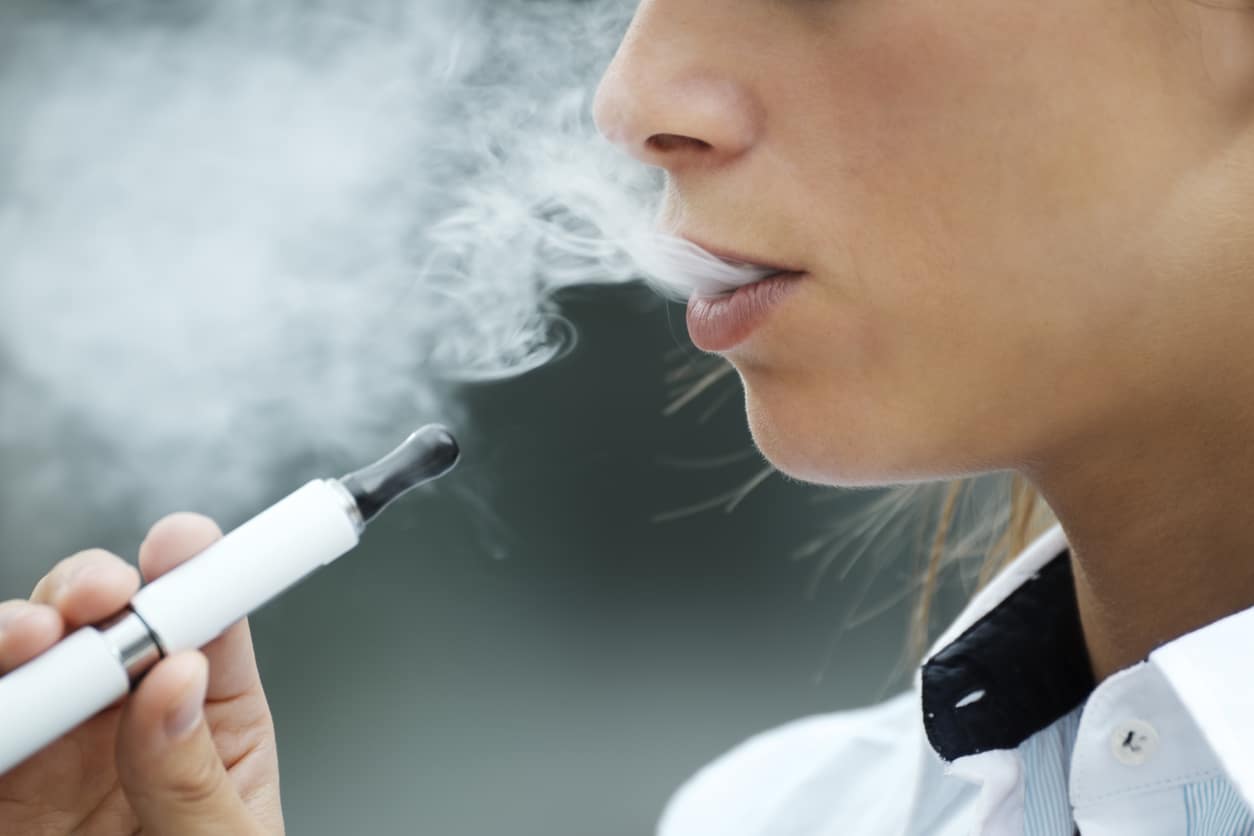Brian White | May 18, 2022 | Texas Laws

Vaping has become a popular alternative to smoking tobacco products. Vaping devices allow the user to inhale an aerosol that contains nicotine and other chemicals. Many vaping products contain flavorings, making vaping attractive to younger users.
Vaping devices are battery-operated. Some devices are disposable, while other vaping devices are rechargeable. They may resemble a USB memory stick, standard cigarette, or cigar. Continue reading to learn more about these devices and the Texas laws that apply to them.
How Do Vaping Devices Work?
Generally, a vaping device consists of four components:
- The cartridge or pod, which contains a liquid solution made of chemicals, nicotine, and flavorings
- An atomizer (heating element)
- A battery for power
- The mouthpiece used to inhale the vapor
The solution is heated so that it vaporizes. Then, the user inhales the vapor or aerosol by puffing on the mouthpiece.
What Are the Vaping Laws in Texas?
Texas laws define an e-cigarette as any electronic device that simulates smoking by using a battery, electronic circuit, or heating element to dispense nicotine or other substances by inhaling from the device. It also includes a consumable liquid solution or other material that is vaporized or aerosolized during the use of an electronic cigarette or device.
The sale of nicotine containers for e-cigarettes must be sold in a child-resistant container. In addition, the container must be a cartridge that is sealed and prefilled by the manufacturer. The cartridge is not intended to be opened by the consumer.
Texas Health & Safety Code §161.082 prohibits the sale of tobacco products, including e-cigarettes and cigarettes, to anyone under the age of 21 years. It is also against the law to sell or give the products to someone who intends to give the product to a person under 21 years of age. A violation of the code section is a Class C misdemeanor.
It is also against the law to distribute e-cigarettes, cigarettes, and tobacco products to anyone under 21 years of age. Distributing tobacco products to underage users is a Class C misdemeanor.
However, a person at least 18 years of age who has a valid military identification card from the United States military or state military forces may legally purchase the products.
Smoking e-cigarettes in public places was banned by the Houston City Council in March 2022. Vaping products and e-cigarettes were added to the smoking ordinance within the city limits.
Is Vaping Safer Than Using Traditional Tobacco Products?
Many people vape because they believe it is safer than smoking traditional cigarettes. However, evidence indicates vaping can be highly addictive and harmful to your health, especially for teenagers.
Vaping injury lawsuits have been filed alleging various injuries and illnesses associated with the use of e-cigarettes and vaping products. Some e-cigarettes and vaping products have malfunctioned and exploded during use.
The injuries caused by defective vaping products and e-cigarettes can include:
- Severe burns
- Skin and bone loss
- Facial injuries
- Secondary infections from burns
- Loss of mobility
- Disfigurement
- Brain injuries
- Permanent nerve damage
In addition to the risk of injury caused by a defective vaping device, other studies show vaping can cause lung damage (i.e., popcorn lung) and nicotine addiction. Furthermore, the chemicals used in vaping products might increase the risk of heart attacks, seizures, strokes, and cancer.
Lung injuries caused by vaping can result in permanent impairments and death. As a result, numerous lawsuits have been filed against JUUL Labs and other companies that produce e-cigarettes and vaping products. The lawsuits allege several causes of action, including defective products and failure to warn of risks.
What Should I Do if I Suffered an Injury After Using an E-Cigarette or Vaping Product?
Seek medical attention if you notice signs of health problems after using vaping products, including lung injuries. Some common signs of health problems associated with vaping and e-cigarettes include, but are not limited to:
- Coughing
- Lung pain
- Shortness of breath
- Chest pain
- Vomiting
- Headaches
- Wheezing
- Diarrhea and feeling nauseous
- Fatigue
- Fever
- Sore throat
If a vaping product explodes or causes burns, seek immediate medical attention. Secure the vaping device, instructions, and all other information or devices in a safe location whenever possible. It could be evidence in a personal injury lawsuit.
A product liability lawyer can assess your case to determine if you have a claim against the vape manufacturer and other parties. Parents of teenagers who have been injured because of vaping may be able to file a lawsuit on behalf of their teenagers against JUUL and other parties who produce, distribute, and sell vaping products.
If the parties are liable for damages, you could receive compensation for your economic damages, including medical bills, out-of-pocket expenses, and lost wages. You could also be entitled to compensation for non-economic damages, including permanent impairments, pain and suffering, and loss of quality of life.
Contact the Houston Personal Injury Lawyers at Attorney Brian White Personal Injury Lawyers For Help
For more information, contact the Houston personal injury law firm of Attorney Brian White Personal Injury Lawyers by calling (713) 500-5000.
Attorney Brian White Personal Injury Lawyers
3120 Southwest Freeway, Suite 350
Houston, TX 77098
United States
Attorney Brian White Personal Injury Lawyers – East Fwy
11811 East Fwy, Suite 630-06
Houston, TX 77029
United States
Attorney Brian White Personal Injury Lawyers – South Loop
2600 S Loop W, Suite 293
Houston, TX 77054
United States
